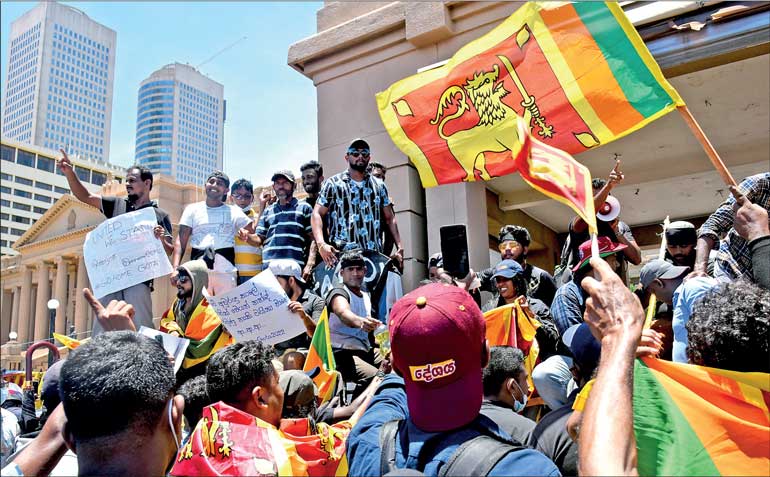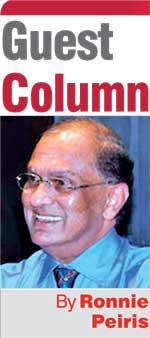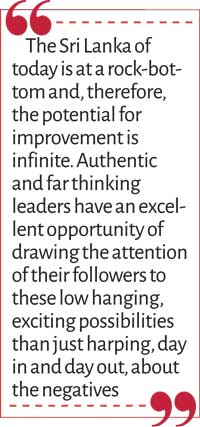Saturday Feb 21, 2026
Saturday Feb 21, 2026
Wednesday, 15 June 2022 00:30 - - {{hitsCtrl.values.hits}}

The Sri Lankan citizen is not an idiot – other than in their choice of leaders in the past. Thanks to the spirit of the “Aragalaya,” they are, now, more enlightened. They are informed enough, and mature enough, to understand the situation and adjust accordingly - Pic by Ruwan Walpola
Sri Lankans are being gradually, but surely, and unconsciously, dragged to a feeling of hopelessness and mental paralysis in the face of the incessant cacophony of “gloom” and “doom” news spewing forth from the mouths of our leaders. “It has just been one thing after another. We have been sitting with challenges that most of us have not faced in our lifetime. It is a lot to process, make sense and adapt to,” says my middle-aged colleague. “Finding a balance between staying informed and reducing stress is a challenge,” he adds.
leaders. “It has just been one thing after another. We have been sitting with challenges that most of us have not faced in our lifetime. It is a lot to process, make sense and adapt to,” says my middle-aged colleague. “Finding a balance between staying informed and reducing stress is a challenge,” he adds.
Whilst the negativities of the present economic, and political, situation, the likes of which we have never experienced before, are undeniable and demand a rapid, and significant, change from the unsustainable way of life we had become accustomed to in the last four decades, I believe that the preponderance of pessimism in the recent communications has led, and will lead, to a stymying of our innovative, and imaginative, thinking and our fighting spirit. As bleak as the situation may be, it is essential that we retain some level of consumer confidence if we are to avoid a total collapse of our economic system. It is against this background, I state, it is critical that our national, corporate, and societal leaders to infuse some optimism to their, presently, over pessimistic communications.
Placing matters in context – Sri Lanka is currently engaged in the battle of its life as it tries to rise above the economic and social ruin brought upon by self-centred politicians who have made merry at the expense of the country’s gullible voting citizens. The crisis has created great uncertainty, heightened levels of stress, anxiety and depression and encouraged a tunnel vision where people focus only on the present with little, or no, consideration of the future. Simply stated, most of the people are living just for the moment. In this situation, leaders must communicate clearly and simply and, through such communication, build resilience and hope and distil meaning from the surrounding chaos.
While leadership styles can range from the humble and participative to the garrulous and overconfident to the psychopathic, narcissistic, and autocratic, there is nothing more demoralising than a leader, who through his insidious behaviour, causes derailment of a journey to a destination of promise. As stated by Napoleon Bonaparte, “A leader is a dealer in hope.” Whatever the situation, a leader’s primary task is to inspire hope. It is to paint pictures of a better tomorrow while talking honestly, and openly, about the challenges of today.
Having carefully assessed many recent messages, from our leaders, for their psychological impacts, I conclude that they are overladen with pessimism. I also believe that the tone, and drift, of these messages, in their current form, will lead to a negative self-fulfilling prophecy where people behave in a way which results in those gloomy expectations becoming a reality. It is in times of seeming hopelessness that we require leaders to exhibit a deliberate calm and bounded optimism and exude an air of assurance in showing they can meet any challenge even when constrained by a lack of certainty about when and how the crisis will end.
even when constrained by a lack of certainty about when and how the crisis will end.
In times of crises, people rely on leaders to inspire and inform rather than be just purveyors of unwelcome news. They look for strength in their leaders to help them gain clarity and a grounded hope for a better future. They seek someone with a positive vision, who is confident about tackling the problems. Certainly not someone, solely, spelling disaster. In keeping with the sense of calmness as advocated before, let us pause, and reflect, on Sri Lanka’s status quo. In early April 2022, the Sri Lankan Government announced a soft default by virtue of its inability to pay its foreign creditors as and when they fall due because of the lack of foreign currency. The sad fact is that, leave alone the lack of foreign currency, the Government has no money even to meet its local obligations. In such circumstances, they have resorted to printing money. As we all know, the excessive printing of money brings in its wake a host of other economic travails and tribulations, the primary of which is inflation. The inability of the Government to meet its debt obligations is insolvency at a national level. Insolvency at a national level is also referred to as national bankruptcy.
Putting on my accountant’s hat, insolvency, in a household or a corporate sense, is where the value of the subject’s assets is less than the value of the subject’s liabilities. From this perspective, is Sri Lanka really insolvent? Whilst acknowledging the differences between country accounting and corporate accounting, but – still mirroring the assets against liabilities perspective, I believe that present value of Sri Lanka’s assets, both tangible and intangible, and the future cash flows of these assets, if managed and governed right, is more than its national debt of approximately $ 83 billion. The national debt comprises of foreign debt of $ 51 billion and domestic debt of $ 32 billion.
As we all know, Sri Lanka enjoys many location-based comparative advantages and nature endowed assets ranging from a 21,450 square kilometres of territorial waters, a convenient-value adding junction in heavily traversed shipping lanes, fertile agricultural land, proximity to India and China, two countries which account for approximately 38% of the world’s population and relatively reliable monsoons to pristine beaches, historical attractions and a time-zone which can cater to the needs of both the east and the west. These are just a few assets which immediately come to my mind. The unlocking of this enormous value is, obviously, dependent on them being “managed right” and “governed right.”
This is the optimism, the positive aspect, which we must blend into messages which can have rings of defensive pessimism, defensive pessimism being an approach where people, and leaders too, set unrealistically low expectations prior to entering a situation to prepare themselves for potential failure and to motivate themselves to work hard to avoid that failure. Needless to state, there can be times when leaders set low targets just to make themselves look good!
“Managed right” and “Governed right” are, as concepts, not an impossibility even in a Sri Lanka which has been stripped of its economic resources and human motivation by self-centred, and self-enriching, egoistic leaders whose chameleon-like leadership styles transform them from being humble servants at time of election campaigning to arrogant masters when in power. If Sri Lanka is to bring about an economic renaissance, or more importantly a renaissance of good behavioural values, it must, as a first step, be relentless in identifying and electing visionary, and selfless persons – persons, who, without compromising the principles of meritocracy, transparency, integrity, and ethicality, are committed to achieving the national goals and objectives which benefit the citizens of our country.
the citizens of our country.
The idea of a “selfless politician” is an oxymoron when seeing from a Sri Lankan lens and viewed against the self-inflicted catastrophe we have got into, economically, politically, and spiritually. Perhaps, many of you will relegate this thought of a “selfless politician” to a status of impractical idealism. A utopian dream. However, being an eternal optimist most of my life, I am confident that we have, out there, many capable persons who more than meet the bill. We must seek them. Unlike Diogenes, the famed cynic philosopher of ancient Athens, who famously strolled those streets, lamp in hand, in search of “One Honest Man”, who he never found, we, as reawakened citizens of this country, must find our ideal leaders.
Finding the leaders, by itself, is not enough. We must, through our peaceful protests, focused pressure and other actions, demand, and seek, a system of governance which has at its heart enforceable features of transparency and accountability. It must be a system which attracts capable persons with the relevant skills and qualifications. A system which allows the exercise of duties and responsibilities with a sense of pride and dignity. A system within which a person of repute, and merit, is comfortable to work in. We must not postpone the rooting of such a system on the premise that our immediate focus must be on addressing the fuel, cooking gas and fertiliser shortages.
Procrastination, as we have learnt bitterly, is the thief of time. We must acknowledge that the “Aragalaya” has been influential in stirring within us a nationalistic fervour which has opened our minds to a more intense realisation of the deformities in our political system and the superficiality of our short-term mindsets. Let us quickly leverage these realisations before we are lured, once again, by easy materialism. Surely, there are many “Honest and Capable Women and Men” among the 14 million adults in our country of 22 million people. Surely, there are sufficient thought leaders in that 14 million adults with the intellectual and organising capability, and capacity, in establishing a political and governance system which can provide our citizens a better, but a sustainable, quality of life.
Nothing is more annoying than when people are heard to say, “Who will be there to lead us if so and so is not there.” Just reflect – Had Christopher Columbus, Amerigo Vespucci and others not ventured into unknown horizons, the world would not have discovered the Americas in the late 15th century. We must banish our fear of the unknown. We must free ourselves from the shackles of doubt. The Sri Lanka of today is at a rock-bottom and, therefore, the potential for improvement is infinite. Authentic and far thinking leaders have an excellent opportunity of drawing the attention of their followers to these low hanging, exciting possibilities than just harping, day in and day out, about the negatives.
Let us take a cue from Barack Obama who said, “This is our moment. This is our time — to put our people back to work and open doors of opportunity for our kids; to restore prosperity and promote the cause of peace; to reclaim the American Dream and reaffirm that fundamental truth that out of many, we are one; that while we breathe, we hope, and where we are met with cynicism, and doubt, and those who tell us that we can’t, we will respond with that timeless creed that sums up the spirit of a people: yes, we can – ‘YES WE CAN’.”
 In selling hope, our national leaders will do well to talk less about eating two meals a day, empty coffers and printing a trillion rupees and talk more on how they plan to resolve the issues. The Sri Lankan citizen is not an idiot – other than in their choice of leaders in the past. Thanks to the spirit of the “Aragalaya,” they are, now, more enlightened. They are informed enough, and mature enough, to understand the situation and adjust accordingly.
In selling hope, our national leaders will do well to talk less about eating two meals a day, empty coffers and printing a trillion rupees and talk more on how they plan to resolve the issues. The Sri Lankan citizen is not an idiot – other than in their choice of leaders in the past. Thanks to the spirit of the “Aragalaya,” they are, now, more enlightened. They are informed enough, and mature enough, to understand the situation and adjust accordingly.
Therefore, let there be more messages of hope from our leaders – messages on how Sri Lanka plans to increase its exports; how the country plans to move from being a seller of commodities to being a seller of value added commodities; how the leaders plan to establish a system of laws which apply equally to everyone – irrespective of caste, race or creed; how Sri Lanka intends to attract foreign direct investment; what steps will be taken to making Sri Lanka the “bread basket” of Asia; how they plan to make Sri Lanka a preferred tourist destination; how they plan to lead by example and be role models, et cetera et cetera. The list is endless.
Our leaders must talk the right language in inspiring a shared vision, entrenching a sense of purpose and in creating in all our citizens, whether they be Sinhalese, Tamils, Muslims or other, a sense of belonging. Our leaders must talk about what steps they are taking in ensuring that the country’s operating model has checks and balances and that no one individual has unfettered powers of decision making. They must describe how they intend to listen, and better respond, to the voice of the people.
Yes – there is so much of assurance enhancing, progressive intentions our leaders can talk about, than bombarding us with messages of doom and gloom. In concluding, our leaders must take cognisance of a quote from Thich Nhat Hanh, the renowned Vietnamese monk, which reads: “Hope is important because it can make the present moment less difficult to bear. If we believe that tomorrow will be better, we can bear a hardship today.”
(The writer is currently a Leadership Coach, Mentor and Consultant, and boasts nearly 50 years of experience in very senior positions in the corporate world – local and overseas.)